
Of Fathers and Sons: Incorporating Children into Transitional Justice
Syrian Director Talal Derki’s most recent film, Of Fathers and Sons, provides an intimate portrait of a Syrian family in Idlib, following their daily life amidst conflict. The father, Abu Osama, a member of the Al Qaeda affiliated Jabhat Al Nusra, is depicted in the film raising his sons to embrace the group’s radical ideology. The film, winner of the Grand Jury Prize for World Documentary at the Sundance Film Festival, will screen in Washington, DC on Saturday October 13. SJAC’s Executive Director will participate in a panel discussion following the film. In anticipation of the screening, SJAC seeks to highlight how children, such as those depicted in the documentary, can best be integrated into transitional justice programs.
Throughout the film, Abu Osama’s children experience a variety of traumas and violations. They are denied the right to go to school, are exposed to radical and violent ideology, see their father suffer a severe injury, live through a bombing that destroys a section of their home, and are sent to a military camp where they are trained as Al-Qaeda recruits. Most transitional justice processes were engineered with adult victims and perpetrators in mind, but Of Fathers and Sons provides a stark reminder of the complicated ways in which children are affected by and participate in violent conflict. The stories of these children and others like them must be considered in the design of future justice programs.
When designing transitional justice processes to be inclusive of the needs of children, it is first important that children be understood as victims of conflict, not perpetrators of it. While child soldiers can participate in violence, and even commit serious crimes, whenever possible accountability for children should be seen as a rehabilitative, not criminal, process. This distinction has often been overlooked, such as when Iraq prosecuted children as young as nine for affiliation with ISIS. Instead, children who participated in an armed conflict, even within extreme factions, should participate in programs to help them reintegrate into their communities and families, such as child centric DDR programs and, when necessary, de-radicalization programs. Those that committed crimes can participate in public apologies or reparations via community service, as well as other processes that are inclusive of children.
At the most basic level, a transitional justice program aiming to be inclusive of children must ensure information about the programs and children’s rights are disseminated to communities. Oftentimes reparations and other services are available to children, but they and their caretakers are unaware of the potential benefits. Any outreach efforts undertaken as part of a transitional justice process should include material created specifically for children. In Kenya, the Truth, Justice and Reconciliation Commission worked with the school system to identify victims and to integrate information about transitional justice directly into the school curriculum. In the former Yugoslavia, staff from the ICTY visited schools to discuss ongoing criminal trials with students. The Truth and Reconciliation Commission in Sierra Leone published a child friendly version of its final report, as well as a version in the form of a graphic novel, designed specifically for secondary students. These steps not only ensure that child victims are informed about the justice process, but that all children develop a nuanced understanding of the past, so that they are less likely to adopt simplistic and potentially divisive narratives.
Even with proper communication, child participation in transitional justice processes is often not possible unless specific support mechanisms are in place. In the context of truth commissions and criminal trials, children must be supported in order to provide testimony as both victims and witnesses. This was done previously in Liberia, where the Truth and Reconciliation Commission worked directly with local child protection agencies to ensure that children who participated had access to social workers while testifying. The Truth and Reconciliation Commission in Sierra Leone hosted special, closed hearings exclusively for children to maintain their privacy while still contributing to the Commission’s investigation.
Transitional justice should go beyond mere inclusion, however. By designing programs with children in mind, transitional justice can better address experiences specific to children, including child recruitment and the loss of educational opportunity. Such an approach requires careful planning, as exemplified in Colombia. Although Colombia included former child soldiers in its reparations program, experts have commented that monetary compensation may not be the best fit for children since the immediate benefits often flow to parents rather than children Moreover, some beneficiaries reported being confused as to why they were being paid for participating in the conflict. Instead, experts have suggested that reparations in the form of educational scholarships, for example, ensure that children benefit directly, and could also help address the loss of educational opportunities experienced during conflict.
Many children in Syria, including those depicted in Of Fathers and Sons, have experienced immense trauma and will need extensive assistance, including psychosocial support, in order to heal. Participation in transitional justice processes is another way children can begin to heal and understand their experiences. While the above provides a general framework as to how such a process can be inclusive of children, the specific programs offered will need to be designed for the Syrian context. For example, if the children in the documentary attempt to reintegrate into society post-conflict, they may face social stigma for their involvement in extremism or struggle with parents who still hold radical beliefs. The work being done today to record and understand the experience of children in the conflict should be utilized to inform a more inclusive and child-centric approach to future justice in Syria.
Of Fathers and Sons will be screening at Washington, DC’s Double Exposure Film Festival on Saturday, October 13. SJAC’s Executive Director will participate in the post-film panel discussion. Click here to attend.
For more information or to provide feedback, please contact SJAC at [email protected] and follow us on Facebook and Twitter.